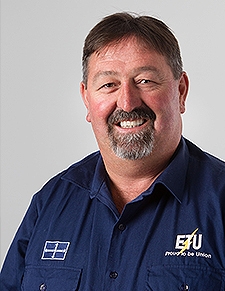A key Gippsland-based union official’s year-long fight against a work site entry ban has been successful, after he was granted entry permit rights in the Fair Work Commission on Thursday.
Electrical Trades Union Gippsland organiser Peter Mooney was blacklisted from entering sites by the FWC early last year, for failing to disclose past industrial misdemeanours in a permit application and failing to satisfy the Commission’s “fit and proper person” test.
Union officials are required to hold an entry permit in order to gain access to workplaces, under the Fair Work Act 2009.
Welcoming the overturn on Friday, Mr Mooney slammed the initial decision as a complete waste of time and taxpayers’ money.
“It’s been extremely frustrating for me and my role representing hundreds of workers across Gippsland. I’ve been quite hamstrung in my ability to investigate my members’ issues at a number of worksites,” Mr Mooney said.
With a six-month industrial dispute against Esso on the verge of escalation and the next round of enterprise bargaining negotiations due to commence at the Maryvale Mill next month, Mr Mooney said the overturn couldn’t have come sooner.
“I’ve had to rely on the good-will of companies to invite me in to perform my role, but I’ve had some troubles on certain construction sites with that,” he said.
A permit renewal application by the ETU’s parent union on Mr Mooney’s behalf was rejected in the FWC in April last year.
The rejection cited a previous disregard for industrial legislation provisions and a “lack of due diligence” in his failure to disclose numerous breaches of industrial law in previous permit applications.
Overturning the decision on Thursday, FWC vice president Adam Hatcher said he was convinced with a “sound basis for confidence” Mr Mooney had shown cause throughout the appeals process he would “properly and lawfully exercise rights attaching to such a permit” if granted.











